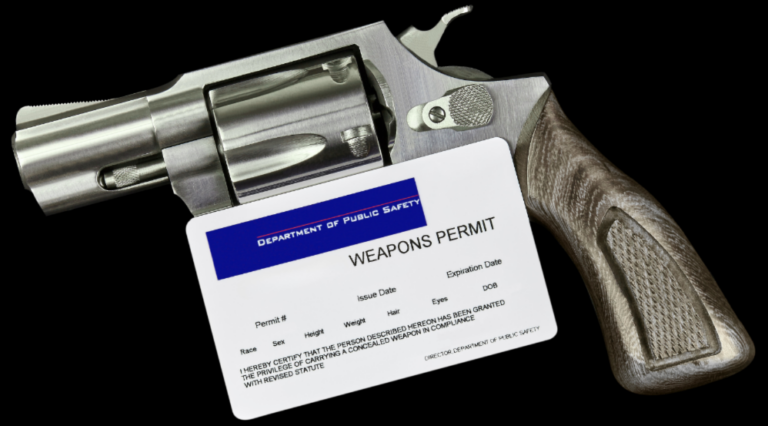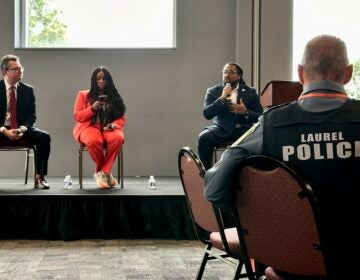Federal judge denies bid to halt enforcement of Delaware law requiring permit to buy handgun
Members of the gun rights lobby had argued that the state’s infrastructure was faulty, and could result in a de facto ban for would-be buyers.
Listen 0:44
Starting Sunday, a Delaware law requiring a permit to buy a handgun goes into effect. (State of Delaware)
From Philly and the Pa. suburbs to South Jersey and Delaware, what would you like WHYY News to cover? Let us know!
A federal judge on Friday denied a motion by Delaware’s gun rights lobby to halt enforcement of a new law — set to take effect Sunday — that requires a permit to purchase a handgun.
U.S. District Court Judge Maryellen Noreika rejected the bid for an emergency preliminary injunction to delay the so-called permit-to-purchase statute, also known as P2P.
The law requires prospective buyers to take a gun training course, fire live rounds of ammunition, undergo fingerprinting and pass a state and federal background check to get issued a permit.
The law passed the Delaware General Assembly and was signed by Gov. John Carney in May 2024, but lawmakers gave the State Bureau of Identification and other agencies 18 months to put a permitting process in place. The date of enactment is Sunday, but Second Amendment advocates, one gun dealer and Delaware’s National Rifle Association affiliate sued last year to overturn the law.
Their lawsuit before Noreika hasn’t been decided, but a companion suit filed this month sought the injunction to prevent P2P from taking effect now.

Noreika held a hearing Thursday afternoon, during which she peppered attorneys for the state and gun lobby with questions. She required both sides to file more paperwork Friday, which they did, and then issued her ruling at roughly 5:30 p.m.
Noreika essentially ruled that the gun rights lobby didn’t make a strong enough case that they would prevail in their lawsuit.
“Because the Court finds that plaintiff has failed to demonstrate likelihood of success on the merits, it need not evaluate the other factors of the analysis: irreparable harm, balancing of the equities, and public interest,’’ Noreika wrote. “For the foregoing reasons, plaintiffs’ motion for a preliminary injunction is denied.”
Mat Marshall, spokesman for Attorney General Kathy Jennings, expressed gratitude about the decision.
“This is a win for everybody who is impacted by gun homicide, gun suicide and gun trafficking,’’ Marshall told WHYY News on Friday night. “Tonight in this country, the leading cause of death for teens and children will be guns, and permit-to-purchase is the gold standard policy nationwide for evidence-based practices to change that.
“So the war’s not over here. We’ve still got motions in front of us, but it’s a very encouraging development out of this court.”
Francis X. O. Pileggi, attorney for the gun rights lobby, was gracious after losing the battle for an injunction, but said the fight continues.
“I understand the attorney general is doing what she thinks is right, but we have a different view of the law and we’re going to consider our options,” Pileggi said.
Lawyers for state and gun rights advocates spar during hearing
Beyond the gun advocates’ objections that the law violates the “right to bear arms” guaranteed in the Second Amendment of the U.S. Constitution, they argued during Thursday’s 75-minute hearing that Delaware officials botched the rollout of the permitting process.
State police, who oversee the State Bureau of Identification, did not have an application available until Oct. 28, 19 days before prospective buyers would be required to present a laminated permit similar to a driver’s license to make a purchase.
Since state officials have 30 days to decide on a permit, the gun rights lobby argued in court filings and before Noreika that the delays in opening the application portal could create an unconstitutional de facto ban on purchasing a handgun starting Sunday.
They also asserted that SBI’s requirements should have gone through the state’s copious process to create regulations, which often takes several months and gives residents time to offer comments on proposed rules.
“The government, the state, is treating this natural right [to buy handguns] like it were a government gift, like food stamps,’’ Pileggi said during the hearing. “Due to their lack of planning, they waited until the last minute” to open an application process filled with obstacles for would-be handgun buyers.
“Now they say because a few permits have been issued, [his clients] should be happy and go home,” he added.
Lawyers for the state countered that more than 200 permits have already been issued, though they acknowledged that all but three were approved for law enforcement officers and others exempted from taking the training course or firing live rounds at a shooting range. The state also argued that while regulations can be put in place to implement a law, they are not required.
Noreika, however, said during the hearing that it appeared to her that state police added requirements that were not in the law and normally would require official regulations.
She noted a couple provisions cited by Pileggi that are on the state’s website as “firearms training course guidelines.” Those rules say SBI must approve training courses and instructors. The law does not require such approvals.
Noreika also personalized her inquiry. She speculated that if she had taken a FBI firearms course three years ago, she might think it wasn’t valid since the FBI is not on the state website’s list of approved instructors.
While state attorney Austin Evers said SBI would merely check that the FBI course meets the requirements outlined in the law, Noreika countered that she would have no way of knowing that if she wanted to get a permit, and might think she needed to take a new course, which could take weeks to schedule and complete.
Evers said the state would remove those provisions to clear up any confusion among permit seekers and to remain within the bounds of the law so no official regulations would need to be proposed, reviewed and approved — a process that takes several months.
The state’s lawyer also told the judge that the law and how it’s being implemented is the opposite of a ban and will result in fewer handgun deaths.
“This statute has two core principles: a scheme to allow people to buy and and sell handguns — not a total ban — to address real threats to public safety,’’ Evers said.
Jennings, who attended Thursday’s hearing, said afterward that regardless of what Noreika decided on the injunction issue, she believes the law that was passed in 2024 after a five-year legislative effort will ultimately be upheld.
Jennings said afterward that she didn’t think Noreika would issue an injunction because the judge would first need to determine that the lawsuit had a “likelihood of success on the merits.’’
She said similar permit bills have been upheld in other states — such as in neighboring Maryland — and that in Delaware, “we firmly believe that this law is constitutional and passes muster.”
Excerpts from Judge Noreika’s opinion
Noreika’s nine-page opinion Friday discussed the claims that the state should have gone through the official regulation process.
She wrote that while the plaintiff’s “argument that these ‘guidelines’ may be improper is not frivolous, it is also moot.”
That’s because the state “agreed to withdraw these guidelines,” such as requiring SBI approval of courses and instructors, and had done so Friday.
“The court cannot, thus, find that plaintiffs have established a reasonable expectation of success that the retention of these now withdrawn ‘guidelines’ entitles them to relief,” Noreika wrote.
Her opinion also addressed the issue of whether the state can process applications efficiently.
She noted that, according to the state’s filing Friday, “a recent civilian applicant used the state’s fingerprinting portal, then fielded a phone call from the SBI regarding his permit application, which was approved in 3 days.”
None of the plaintiff’s arguments “meaningfully disputes that showing of workability,’’ the judge wrote. “Consequently, the court cannot say that they have made a ‘clear showing’ that the state’s infrastructure is not sufficient ‘to enable any eligible Delaware adult resident to readily apply for and obtain the required handgun qualified purchaser permit needed to buy or sell a handgun within the statutory thirty-day period for the State to issue such permits.’”
WHYY is your source for fact-based, in-depth journalism and information. As a nonprofit organization, we rely on financial support from readers like you. Please give today.







